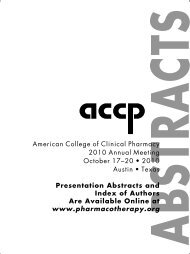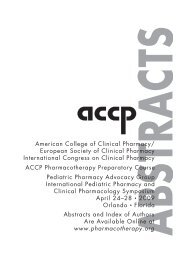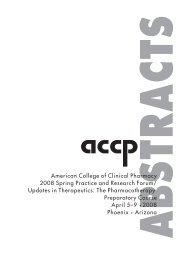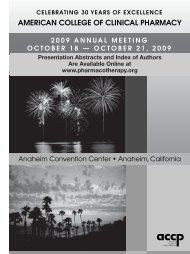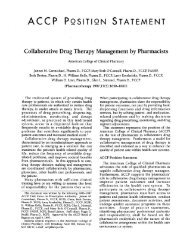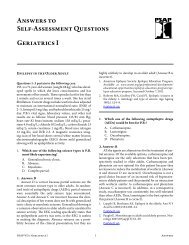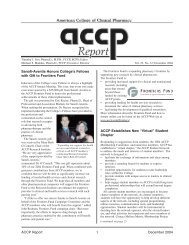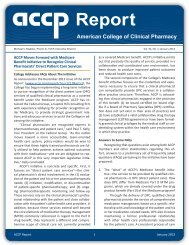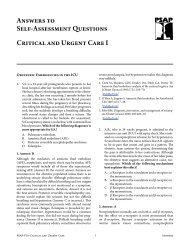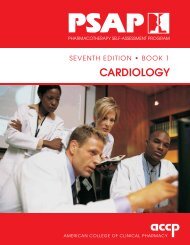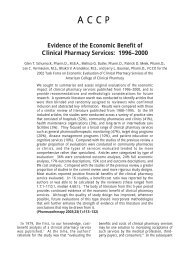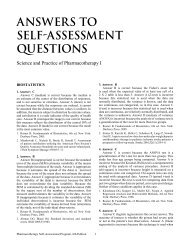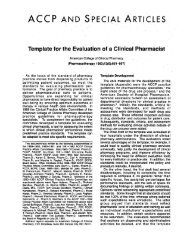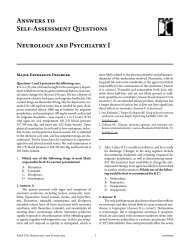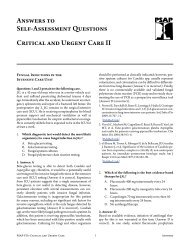Answers to Self-Assessment Questions - ACCP
Answers to Self-Assessment Questions - ACCP
Answers to Self-Assessment Questions - ACCP
Create successful ePaper yourself
Turn your PDF publications into a flip-book with our unique Google optimized e-Paper software.
level. Exclusion of conventional vitamins and minerals<br />
from the definition of dietary supplements (Answer A)<br />
would make supplement use appear <strong>to</strong> be less common<br />
than more common, making Answer A incorrect. Because<br />
more people will have used dietary supplements within the<br />
past month than within the past week, querying about use<br />
of supplements within the past month rather than the past<br />
week (Answer B) would appear <strong>to</strong> make supplement use<br />
more common; therefore, Answer B is correct.<br />
1. Kelly JP, Kaufman DW, Kelley K, Rosenberg L, Anderson TE,<br />
Mitchell AA. Recent trends in use of herbal and other natural<br />
products. Arch Intern Med 2005;165:281–6.<br />
2. Kennedy J. Herb and supplement use in the U.S. adult<br />
population. Clin Ther 2005;27:1847–58.<br />
69. Answer: A<br />
D.L. has heard that black cohosh may alleviate some of<br />
her menopause-related symp<strong>to</strong>ms but is concerned about<br />
the risk of developing breast cancer. Although the evidence<br />
demonstrating efficacy of black cohosh in relieving vasomo<strong>to</strong>r<br />
symp<strong>to</strong>ms associated with menopause is inconsistent, it<br />
appears <strong>to</strong> be safe and may be of benefit for some women<br />
experiencing mild symp<strong>to</strong>ms. The dosages most commonly<br />
used in clinical trials were black cohosh extract standardized<br />
<strong>to</strong> the 1-mg equivalent of 27-deoxyacetein twice daily<br />
(Remifemin 20–40 mg or equivalent product twice daily).<br />
Most studies were of short duration, typically lasting a<br />
maximum of 6 months. Based on this evidence, Answer A<br />
(a cautious trial using 20–40 mg of Remifemin or equivalent<br />
twice daily for up <strong>to</strong> 6 months is unlikely <strong>to</strong> do harm) is<br />
the best response and the correct answer. A few cases have<br />
been published reporting hepa<strong>to</strong><strong>to</strong>xicity associated with the<br />
consumption of black cohosh; however, more than 2000<br />
subjects have been enrolled in clinical trials with black<br />
cohosh extract, and no reports of hepa<strong>to</strong><strong>to</strong>xicity have been<br />
published. In addition, there is currently no known plausible<br />
biologic mechanism for hepa<strong>to</strong><strong>to</strong>xic activity of black<br />
cohosh. The recommendation of the National Center for<br />
Complementary and Alternative Medicine and the National<br />
Institutes of Health Office of Dietary Supplements is on the<br />
side of caution, recommending moni<strong>to</strong>ring liver function in<br />
patients consuming black cohosh. Based on this information,<br />
Answer B (the risk of hepa<strong>to</strong><strong>to</strong>xicity with black cohosh is<br />
well established and its use should be avoided) is incorrect.<br />
Current evidence does not support the mechanistic view of<br />
black cohosh possessing estrogenic effects. Instead, research<br />
suggests that black cohosh inhibits binding of sero<strong>to</strong>nin<br />
5-hydroxytryptamine- 1A<br />
and 5-hydroxytryptamine 7<br />
, both<br />
of which are associated with the hypothalamus. Current<br />
information is inconclusive regarding black cohosh and the<br />
risk of breast cancer. It appears <strong>to</strong> be safe in women with no<br />
increased risk of breast cancer; however, current evidence is<br />
insufficient <strong>to</strong> recommend its use in women with increased<br />
risk. Therefore, Answer C (recent trials have demonstrated<br />
an estrogenic effect of black cohosh on breast tissue) is<br />
incorrect. Insufficient evidence exists <strong>to</strong> support an effect of<br />
black cohosh on cardiovascular health; therefore, Answer D<br />
(black cohosh can be recommended for primary prevention<br />
of cardiovascular disease) is also incorrect.<br />
1. National Center for Complementary and Alternative Medicine,<br />
National Institutes of Health Office of Dietary Supplements.<br />
Workshop on the safety of black cohosh in clinical studies.<br />
National Institutes of Health, Bethesda, MD. November<br />
11, 2004. Available at nccam.nih.gov/news/pastmeetings/<br />
blackcohosh_mtngsumm.htm. Accessed Oc<strong>to</strong>ber 31, 2008.<br />
2. Huntley A, Ernst E. A systematic review of the safety of black<br />
cohosh. Menopause 2003;10:58–64.<br />
3. Osmers R, Friede M, Liske E, Schnitker J, Freudenstein<br />
J, Henneicke-von Zepelin HH. Efficacy and safety of<br />
isopropanolic black cohosh extract for climacteric symp<strong>to</strong>ms.<br />
Obstet Gynecol 2005;105:1074–83.<br />
70. Answer: A<br />
D.L. decides <strong>to</strong> try black cohosh. She wants your<br />
recommendation for the most efficacious product.<br />
Remifemin black cohosh extract is the most widely studied<br />
product showing possible efficacy among products available<br />
in the United States (Answer A); therefore, Answer A is<br />
correct. Answer C (studies reporting efficacy and safety of<br />
Remifemin black cohosh extract support use of the extract<br />
for periods extending up <strong>to</strong> 1 year) is incorrect because most<br />
studies have only lasted 6 months or less. The manufacturer<br />
of Remifemin has switched between isopropanolic and<br />
ethanolic preparations and between fluid extracts and dried<br />
fluid extracts, and the package labeling has changed at least<br />
twice. These changes make it difficult <strong>to</strong> compare the results<br />
of the various trials using Remifemin; therefore, Answer B<br />
(Remifemin black cohosh extracts used in clinical studies<br />
has been consistently manufactured) is incorrect. No<br />
black cohosh product has been consistently demonstrated<br />
<strong>to</strong> increase bone density; therefore, Answer D (because<br />
Remifemin has been demonstrated <strong>to</strong> increase bone density,<br />
it should be the black cohosh product of choice) is incorrect.<br />
1. New<strong>to</strong>n KM, Reed SD, LaCroix AZ, Grothaus LC, Ehrlich K,<br />
Guiltinan J. Treatment of vasomo<strong>to</strong>r symp<strong>to</strong>ms of menopause<br />
with black cohosh, multibotanicals, soy, hormone therapy, or<br />
placebo: a randomized trial. Ann Intern Med 2006;145:869–79.<br />
2. Jellin JM, Gregory PJ, Batz F, eds. Pharmacist’s Letter/<br />
Prescriber’s Letter Natural Medicines Comprehensive<br />
Database, 9th ed. S<strong>to</strong>ck<strong>to</strong>n, CA: Therapeutic Research Faculty,<br />
2007.<br />
3. DerMarderrosian A, ed. The Review of Natural Products. St.<br />
Louis, MO: Elsevier Inc., 2005.<br />
71. Answer: C<br />
L.B., a 62-year-old man with hypertension, hyperlipidemia,<br />
and coronary artery disease, wants <strong>to</strong> take ginkgo <strong>to</strong> prevent<br />
Alzheimer’s disease. Although some studies have shown<br />
ginkgo extract <strong>to</strong> be efficacious in slowing progression and<br />
ameliorating symp<strong>to</strong>ms of Alzheimer’s dementia, the overall<br />
combined evidence of benefit in patients with cognitive<br />
impairment or dementia fails <strong>to</strong> demonstrate consistent<br />
efficacy for these disorders. Therefore, Answer B (ginkgo<br />
extract appears <strong>to</strong> be efficacious, but adverse effects and<br />
drug interactions preclude its use) and Answer D (terpene<br />
ginkgolide B is a potent inducer of cy<strong>to</strong>chrome [CYP] P450<br />
3A4 and has the potential <strong>to</strong> interact with drugs metabolized<br />
by this isozyme) are both incorrect. Ginkgo is relatively<br />
safe, and adverse effects are usually mild. Ginkgolide B<br />
is a potent inhibi<strong>to</strong>r of platelet-activating fac<strong>to</strong>r, and there<br />
is an increased risk of bleeding if the extract is taken<br />
concomitantly with antiplatelet agents, such as aspirin.<br />
Therefore, Answer C (ginkgo is generally well <strong>to</strong>lerated, but<br />
Pharmacotherapy <strong>Self</strong>-<strong>Assessment</strong> Program, 6th Edition 51 Gastroenterology and Nutrition <strong>Answers</strong>



